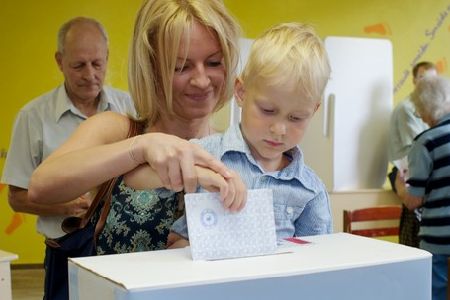
Latvia Facing Its Toughest Test Since 1991 In Upcoming Elections (Part One)
Publication: Eurasia Daily Monitor Volume: 8 Issue: 144
By:

Latvia’s upcoming elections will be the most difficult political test for the nation since the restoration of its independence 20 years ago. Pre-term elections are due to be held, as decided by a referendum on July 23. The upcoming elections will basically replay those held in October 2010, which ultimately proved inconclusive, leading within months to new parliamentary elections and another presidential election.
The government, Western-oriented and battling corruption, is threatened by Latvian oligarchic interests, combining with Russian monolithic voting. Such a combination already dominates the Riga City Council through an alliance of the Russian party, Harmony Center, with the oligarch-led For a Good Latvia party. An alignment of Latvian oligarch groups with the Russian party on a country-wide basis might, for the first time in Latvia, determine the upcoming elections’ outcome. It could in that case bring the Russian party into a governing coalition, and incrementally shift toward a middle course between the West and Russia.
That danger was averted in the October 2010 elections by the center-right, Unity Bloc, winning a narrow plurality of the votes in a split field, and leading the government. However, the parliamentary arithmetic forced Unity to include an oligarch-connected party, the Greens and Farmers’ Union, into the coalition government. It was the price for forming a parliamentary majority, tackling the economic crisis, and ensuring that Latvia should not depend on the Russian party, Harmony Center, for the government’s survival in parliament.
The government’s Unity Bloc brought the economic crisis under control with massive Western assistance and has started the country on the path to recovery. The government, however, collapsed over the issue of oligarchic corruption, which ultimately threatens the economic recovery.
May 23 was the turning point. The Russian party and the pro-oligarch parties joined forces against the government and, by implication, against the re-election of President Valdis Zatlers, whose first term of office was about to expire. Harmony Center, For a Good Latvia, and the Greens and Farmers’ Union jointly blocked the Anti-Corruption Bureau’s ongoing investigation of Good Latvia leader Ainars Slesers’s business firms. Technically, these three parties defeated a state motion to lift Slesers’ parliamentary immunity for a search of his premises. The US embassy had openly supported this investigation and other anti-corruption measures (BNS, May 23).
Slesers’ Good Latvia party operates with Harmony Center in controlling the Riga City Council, a model of coalescence between Latvian oligarch interests and the Russian party. That alignment model reproduced itself in the parliamentary vote. The Unity Bloc and the small nationalist group, All for Latvia/Fatherland and Freedom, were outvoted by the combination of pro-oligarch and Russian votes in parliament.
That pivotal event revealed the possible shape of things to come through a realignment of political forces. It also demonstrated that shadowy business interests could hold the government hostage. On that same day, the Unity Bloc and President Zatlers jointly decided to move pro-actively against that danger. On May 28, Zatlers used his prerogatives to call a referendum on July 23 on the question of dissolving the parliament and holding new elections. He cited oligarchic influence in parliament, resistance to judicial reform and the blocking of anti-corruption measures. Harmony Center supported the holding of new parliamentary elections in order, as it declared, to remove the Unity Bloc from government.
The presidential election was held on schedule in parliament on June 2. Zatlers’s re-election bid, supported by the Unity Bloc, was defeated. The Greens and Farmers’ Union’s candidate, banker Andris Berzins, won narrowly, thanks to the already-tested combination of oligarch-influenced and Russian deputies’ votes. Following the election, Berzins had to assure the country that he “would not be led by any oligarch” – an allusion to the powerful businessman Aivars Lembergs, who is linked with the Greens and Farmers’ Union (BNS, LETA, June 3).
The referendum on July 23 resulted in approval of holding new parliamentary elections, with a staggering 94 percent of the votes cast, in a 45 percent voter turnout (predictably low in summer). The result reflected voters’ frustration with political corruption, aspirations for change and the credibility of Zatlers’s initiative. In the same spirit, Prime Minister Valdis Dombrovskis asked voters to support parties that stand for a law-based state, so that these parties obtain a majority in the new parliament (BNS, ELTA, July 23, 25).
New parliamentary elections are due to be held within a maximum of 60 days in accordance with the constitution. The existing parliament and government will continue working, respectively, until a new parliament is elected and a new government is formed. The new parliament will also hold a presidential election.
Seldom mentioned explicitly by politicians, but generally understood by all sides, the ultimate stake in these elections is Latvia’s national orientation and its geopolitical choice.




